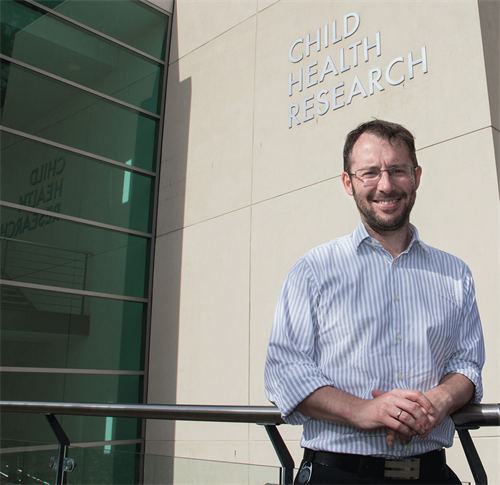Researchers from The Kids Research Institute Australia and Curtin University will use a $3.9 million grant from the National Health and Medical Research Council to investigate whether a type of whooping cough vaccine could provide bonus protection against food allergies and eczema.
Researchers from The Kids Research Institute Australia and Curtin University will use a $3.9 million grant from the National Health and Medical Research Council to investigate whether a type of whooping cough vaccine could provide bonus protection against food allergies and eczema.
The OPTIMUM Study will examine whether a dose of whooping cough vaccine used in many other countries, but not currently in Australia, could boost protection against life-threatening allergies to foods like eggs, milk, soy, peanuts, tree nuts, wheat, fish and shellfish.
Dr Tom Snelling, Director of the Wesfarmers Centre of Vaccines and Infectious Diseases at The Kids Research Institute Australia, said while the benefits of vaccination for preventing serious infection were well known, the research team wanted to determine if the 'whole-cell' whooping cough vaccine had additional benefits.

Dr Tom Snelling, Director of the Wesfarmers Centre of Vaccines and Infectious Diseases
"Allergies occur when the immune system reacts to everyday substances such as different types of food. We believe that by harmlessly mimicking infections, some vaccines have the potential to help steer the immune system away from developing reactions," said Dr Snelling.
"All babies should receive a whooping cough vaccine from six weeks old, and then again at four and six months. In Australia, we currently use the 'acellular' whooping cough vaccine, while in most countries babies receive a 'whole-cell' whooping cough vaccine instead.
"We are trying to understand if using the 'whole-cell' whooping cough vaccine can help train the immune system not to react to these harmless substances, potentially protecting babies from developing allergies in early childhood."
There are currently 250,000 young Australians living with severe food allergy, and up to three in every ten babies born each year will develop either a food-related allergy or eczema.
"Food allergies have been steadily on the rise in Australia over the past 20 years and appear to be getting more severe, sometimes requiring admission to hospital," said Dr Snelling.
"Children can experience swelling of the face and throat, breathing difficulties, as well as skin rashes and occasionally loss of consciousness. This is very frightening for kids and their families.
"We hope that by finding effective ways to prevent allergies, we can reduce the distress and fear faced by many parents when their child experiences a serious allergic reaction and I would encourage people to contact us to get involved in this study."
The OPTIMUM Study hopes to enrol up to 3,000 Australian babies to take part in the trial. Participants will receive all routine baby and toddler vaccines and will be assessed, including by skin testing, to see whether they develop food allergies or eczema by 18 months of age.
For more information about the OPTIMUM Study or to register your interest, please visit vaccine.telethonkids.org.au or email OPTIMUM@telethonkids.org.au.
About The Kids Research Institute Australia:
The Kids Research Institute Australia is one of the largest, and most successful medical research institutes in Australia, comprising a dedicated and diverse team of more than 500 staff and students.
We've created a bold blueprint that brings together community, researchers, practitioners, policy makers and funders, who share our vision to improve the health and wellbeing of children through excellence in research.
The Institute is headed by leading paediatrician and infectious diseases expert Professor Jonathan Carapetis, with Founding Director Professor Fiona Stanley now Patron.
The Kids is independent and not-for-profit. The majority of funding comes from our success in winning national and international competitive research grants. We also receive significant philanthropic support from corporate Australia and the community.
